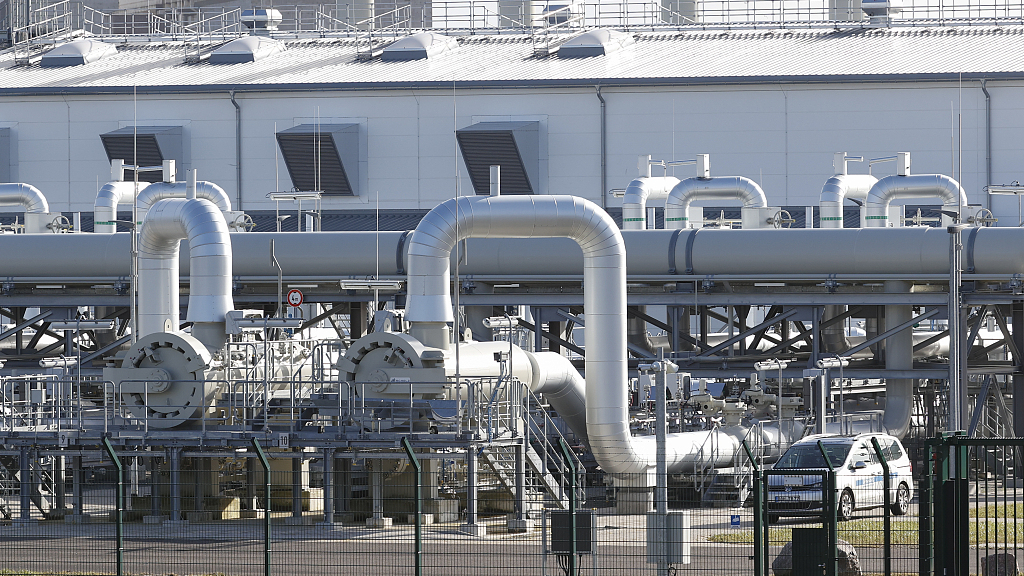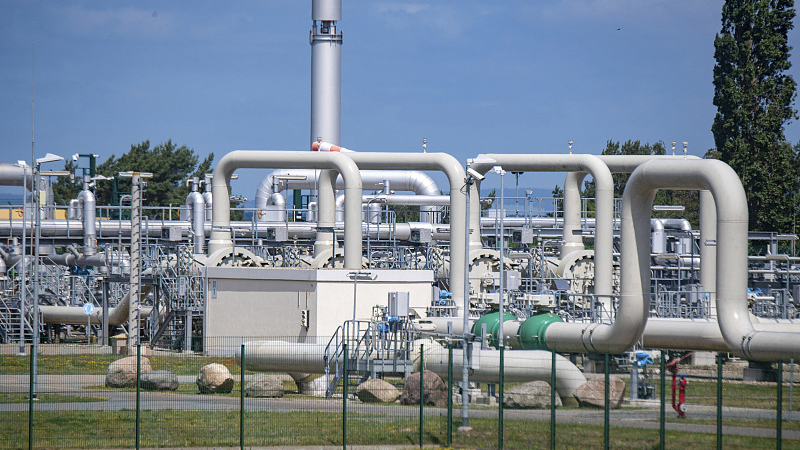
Nord Stream 2 gas receiving station in Lubmin, Germany, February 23, 2022. /CFP
Nord Stream 2 gas receiving station in Lubmin, Germany, February 23, 2022. /CFP
Editor's note: Bobby Naderi is a London-based journalist, guest contributor in print, radio and television, and documentary filmmaker. The article reflects the author's opinions, and not necessarily the views of CGTN.
U.S. officials claim a "pro-Ukrainian group" was behind the Nord Stream pipeline bombings in September 2022. The officials did not provide much detail to support their claim to the New York Times, but cited new intelligence.
Washington had long opposed the construction of Nord Stream 2, with President Joe Biden, showing recklessness, threatening to end the pipeline if there are Russian "tanks or troops crossing the border of Ukraine again." Following the blasts, U.S. officials, including Secretary of State Antony Blinken, celebrated the attacks as opportunity to reduce Europe's reliance on Russian gas.
Does this make U.S. officials' wild-eye claim a desperate attempt to deflect suspicion away from Washington and towards a "pro-Ukrainian group?" If so, could these vague accusations have potential to act as a "diversion" to improve the already fragile relationship between the U.S. and Europe?
The pipeline project was expected to transport natural gas from Russia to Germany via the Baltic Sea. Washington opposed it, arguing that it would increase Europe's dependence on Russian energy and "give Russia undue influence over Europe." In contrast, many European countries backed the project, citing the need for reliable energy sources.
While U.S. officials claim to have new intelligence on the pipeline attacks, they have provided little detail to substantiate that. This lack of evidence may lead some European officials to view the claim as an attempt to deflect blame away from Washington.
Political devolution
The dismal endpoint of Washington's political devolution has been a devastating conflict that has led to an energy crisis of an unpredictable sort, with many European countries struggling to meet their rising energy demand. Meanwhile, the U.S. cannot help Europe overcome its energy challenges.
One of the main reasons is a limited capacity to export natural gas. The U.S. has no infrastructure to export gas in large quantities. Europe also lacks the infrastructure to import American gas, with only a few countries having the necessary infrastructure. This makes it difficult for the U.S. to provide significant assistance to Europe, especially in the winter.
Another reason is domestic energy needs. For the world's largest energy consumer, its own energy needs take priority over its "allies." The U.S. has a growing demand for natural gas due to its increasing use in power generation, manufacturing, and transportation.

A view of pipe systems and shut-off devices at the gas receiving station of the Nord Stream 1 Baltic Sea pipeline and the transfer station of the Ostsee-Pipeline-Anbindungsleitung-Baltic Sea Pipeline Link (OPAL) long-distance gas pipeline in Lubmin, Germany, June 21, 2022. /CFP
A view of pipe systems and shut-off devices at the gas receiving station of the Nord Stream 1 Baltic Sea pipeline and the transfer station of the Ostsee-Pipeline-Anbindungsleitung-Baltic Sea Pipeline Link (OPAL) long-distance gas pipeline in Lubmin, Germany, June 21, 2022. /CFP
Europe relies on Russian gas imports, and the cost of replacing these imports would break many European banks. Building new infrastructure could take years, leaving the continent vulnerable to an endless energy crunch. Additionally, European gas production is in decline, while rising energy costs have pushed up fuel bills and food prices.
The U.S. cannot exert diplomatic pressure on Russia to resolve the Ukraine conflict. Sanctions have had little success to transform Moscow's behavior. To draw insights from what passes for the small stuff in the mainstream media, Russia may continue to use its energy exports as a bargaining chip in negotiations.
Stuck in old ways
Accordingly, the U.S. could not coordinate a unified response with Europe due to political and economic differences. Some countries, such as Germany, supported the Nord Stream 2, while others, such as Poland, opposed it and called for the diversification of energy sources.
While the war and diplomatic tussles play out in devastating daily headlines, it's hard to expect a breakthrough in Washington to set aside its short-term interests long enough to provide a significant solution to Europe's energy crisis. The U.S. is limited by its low production capabilities and infrastructure restraints, a fact that has proven troublesome going forward.
Hence, the U.S. cannot mitigate the greater impact of the Ukraine conflict in Europe. It's a catastrophe for humanity: millions displayed, lives ruined, cities destroyed, and billions invested in killing and destruction. Official Washington had even sought to mobilize a global campaign "for as long as it takes," but with little or no success. They remain stuck in their old colonial ways, and they need to change.
Thanks to the cost of borrowing following interest rate hikes by Western central banks seeking to lower inflation fueled by a war-induced spike in energy prices, many countries didn't join the entire West in imposing sanctions on Russia. They staked out starkly contrasting positions over reviving a world of unaccountable sovereigns, and promoting a war of all against all.
Given their struggles with energy prices, debt, food security, and climate change, many governments selected to increase energy cooperation with Moscow, including raising their purchases of Russian oil. The universalistic sentiment is to look beyond left and right, to pursue an immediate ceasefire and diplomacy to end the war.
(If you want to contribute and have specific expertise, please contact us at opinions@cgtn.com. Follow @thouse_opinions on Twitter to discover the latest commentaries in the CGTN Opinion Section.)